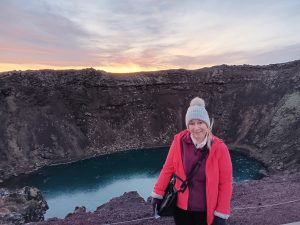Sarah Grocutt investigates the reasons people do long-distance hiking, their motivations and how exercising outdoors boosts wellbeing.
Walking is the most popular leisure activity undertaken by many throughout the world and is encouraged for its many health benefits. Distance walking, also known as endurance walking, involves covering long distances at a steady pace over extended periods. This form of walking emphasises stamina and perseverance rather than speed and is often pursued as a recreational activity. Bauer et al1 state the term ‘hiking’ can be linked to long-term distance, which would typically refer to multi-day hiking trips that cover extensive distances, often over 100 miles or more. These types of hikes usually involve travelling through a variety of terrains and environments and can range from a few days to several months. Some of the most popular long-distance hiking often takes place on established trails, such as the Appalachian Trail in the United States and the Camino de Santiago in Spain.
Multi-day hiking offers an exhilarating blend of adventure and endurance – an unparalleled way to explore nature’s vast landscapes. Unlike day hikes, these extended journeys challenge hikers to push their physical and mental limits, embracing the rhythm of the trail over consecutive days. As you trek from one place to the next, the immersion in natural beauty, the sense of accomplishment with each milestone and the deep connection to the wilderness become profoundly enriching experiences. Whether traversing mountain ranges, forests or coastal paths, multi-day hiking invites you to disconnect from the hustle of daily life, take time out for reflection and refuge, and reconnect with both body and mind while enjoying the simplicity of life on the trail.
Seeking adventure on a long-distance hike
There are many reasons why someone would wish to embark on a long-distance hike, one of these being to seek adventure or experience. Zimmermann & Saura2 define adventure, which derives from the Latin’ adventurus’ as ‘about to happen’, and from ‘adveire’ which means ‘to arrive’. It is necessary that the adventurer be someone who expects the unexpected and is open to new possibilities.
My master’s research project involved interviewing solo participants who had walked via Francigena, an historic pilgrimage route starting in Canterbury and ending in Rome, with distances they walked ranging from 500-2,000km. My study demonstrated and clearly outlined that all 10 participants were motivated by seeking a new adventure. There was satisfaction among the participants from the long-distance walk and many viewed high-mileage walking as a benefit towards their overall health. Ponte et al points out that key motivations can be the performance and achievement of completing an activity.
There were mixed views in my study as to why adventure was important, although 10 mentioned a satisfaction in completing the walk, five were more driven by testing their ability and skills, while five mentioned a feeling of accomplishment and enjoyment. Pomfret states that adventure is challenging and can prompt conflicting emotion, ranging from fear and risk to deep satisfaction and elation.
According to Zimmermann & Saura2, being immersed in the adventure activity can be a moment to be elsewhere, taking time to think about life; this was also evident in my research, which found all 10 participants found refuge. They realised they lacked time in their everyday life for the kind of reflections they could do on a long-distance hike.
Taylor3 argues that some participants’ motivations may be referred to as sensation seeking, in search of adventure, wishing to ‘prove themselves’ and ‘test their limits’. This was apparent in my findings, as seven out of 10 mentioned their desire to physically challenge themselves and to step outside their comfort zone.
There are numerous advantages of long-distance walking, as Saunders et al4 found in their research on 15 long-distance walkers, to include an appreciation of the scenery, meeting other hikers, a sense of being close to nature, solitude, freedom, and time to think and reflect on their 152km trek, and these were key factors they felt contributed towards their wellbeing. One important aspect of long-distance hiking is the potentially transformative nature of the experience. Basil’s5 findings suggest that long-distance hiking journeys can have the power to provide self-definition and personal transformations to the point where a search for adventure may become part of a person’s lifestyle, such as the Appalachian Trail or Camino de Santiago, which has provided a source of outdoor adventure that has allowed hikers a level of personal authenticity and autonomous self-discovery. Saunders et al argue the pace, complexity and uncertainty of present-day life can generate anxiety, depression and personal crisis and suggest that different types of travel, such as long-distance walks, can be effective mediations in many situations routinely seen in counselling, by facilitating new perspectives and building resilience and other coping skills.
Seeking connection
Overall, long-distance hiking is a challenging yet rewarding outdoor activity that combines physical and mental exertion. Physically, it provides an excellent fitness workout, enhancing cardiovascular health, muscular strength and endurance. Mentally, it offers a unique opportunity for introspection and reflection, as the natural surroundings and rhythmic pace can be meditative. Additionally, long-distance hiking fosters a deep connection with nature, promoting environmental awareness and appreciation. Socially, it enables bonding whether hiking with friends, family or meeting fellow hikers on the trail. Finally, the sense of accomplishment from overcoming the challenges of long-distance hiking can be incredibly rewarding, leading to a boost in confidence and resilience.
References:
- Bauer M, Kablan E, Kasuke D, Klauditz A, Nordhorn C & Zilker A (2012), Trekking in the alps? Spaces in trekking tourism from the perspective of Europe, Journal of Tourism, 13(2): 87-
- Zimmermann A, Saura A (2017), Body, environment and adventure: experience and spatiality, Routledge, (11)2: 162-163. doi: 1080/17511321.
- Taylor LJ (2007), Centre and edge: Pilgrimage and the moral geography of the us/mexico border mobilities, 2(3): 384-385.
- Saunders RE, Laing J, Weiler B (2014), Personal transformation through long-distance walking, tourist experience and fulfilment: Insights from positive psychology, Routledge, 127-146.
- Basil MD (2023), Understanding people’s motivations for a long-distance hiking trip, Routledge, 42(2): 284.
- Ponte J, Couto G, Sousa A, Pimentel P, Oliveira A (2021), Idealizing adventure tourism experiences: Tourists’ self-assessment and expectations, Journal of Outdoor Recreation and Tourism, (35): 2-3.
- Pomfret, G. (2012) Personal emotional journeys associated with adventure activities on packaged mountaineering holidays. Tourism management perspectives. Elsevier. p.145.
Additional reading:
Grocutt, S.A. (2024) Treking to rome: an interpretive phenomenological analysis study on long-distance solo walkers and their motivations on via Francigena. No. MAOE4105-002, extended project, University of Worcester.
Author Bio:

Sarah Grocutt BSc (Hons) Cert.ed Dip.ed QTLS
Sarah is a physical education teacher, Pilates instructor and delivers health and wellbeing retreats leading group walking combined with wellbeing activities. A keen marathon runner and long-distance hiker, Sarah master’s degree in outdoor education at the University of Worcester is presently researching health and wellbeing in the outdoors, with specialist interest in long-distance walking. Sarah has recently written a book called Mind-Body Pilates. You can find out more about Sarah here.







